Advantages of Gardening for Seniors: 7 Useful Advices
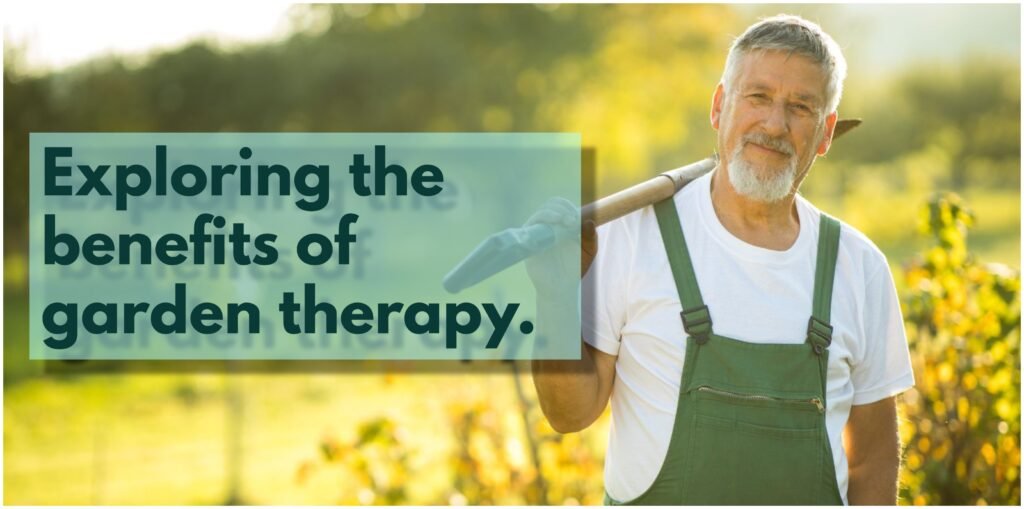
Last Updated on June 30, 2025 by George
Gardening for seniors is a wonderful blend of physical and mental benefits. It’s a hobby that involves moving your body by tilling the soil and watering your plants daily. Also, you’re making mental notes of the plants you manage.
Moreover, gardening has a proven track record of bolstering mental health. Gardening for seniors leads to feeling of accomplishment and satisfaction. Also, you have a chance to connect with the community when tending your garden in your yard.
The connections you build through this simple activity can further boost your quality of life. You can make your golden years the best chapter of your life by simply taking care of plants or growing your own vegetables.
Everything You Need to Know About Gardening for Seniors
Gardening for seniors is your ticket to a healthy retirement period. The beauty of gardening for seniors lies in its simplicity and the profound impact it has. You don’t need to be a gardening guru to feel its positive effects. Research backs up the numerous benefits of gardening for seniors, from reducing stress and improving mood to possibly lowering the risk of dementia.
Understanding that gardening for seniors might come with its challenges, there’s really no cause for concern. This blog post is dedicated to unveiling the countless benefits of gardening for seniors. We are going into detail just how this activity makes you feel like your back in your 30s. Gardening for seniors holds a treasure trove of benefits.
Prefer to listen rather than read?
We’ll also highlight the specific advantages of garden therapy for seniors, such as boosting bone density, fortifying the immune system, and minimizing the risk of falls. Moreover, we’re excited to offer practical tips and insights to navigate the common hurdles faced by senior gardeners.
Join us as we dig deeper into the nurturing and rewarding world of gardening for seniors, showing how it can truly make the golden years glow brighter.
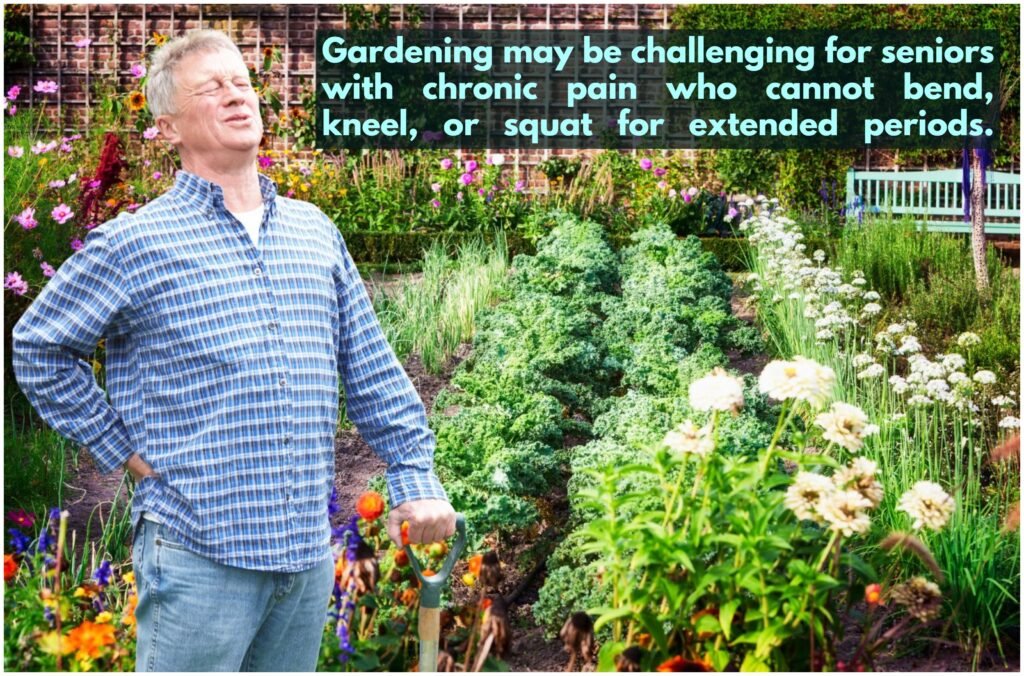
The Joy of Gardening for Seniors Comes With Its Hurdles
Gardening for seniors isn’t just a source of joy and health benefits; it’s a testament to resilience. It nurtures their physical health and emotional well-being but doesn’t come without its trials. Especially for those navigating the golden years, physical limitations and mobility issues can pose significant barriers to fully embracing gardening.
Navigating Limited Mobility
Limited mobility stands out as a formidable challenge for many seniors passionate about gardening. It can transform what should be a leisurely stroll through the garden into a daunting obstacle course. Accessing various garden spots or simply moving around can become a Herculean task. The act of planting, weeding, or watering transforms from a therapeutic routine into a challenge, especially when faced with uneven ground or slippery paths that spike the risk of falls.
The Test of Strength
Then there’s the issue of strength, or sometimes, the lack thereof. Activities that demand muscle power, like digging or lifting heavy soil bags, might no longer be as feasible. This limitation can make essential gardening maintenance feel like an uphill battle.
Battling Chronic Pain
Chronic pain, a constant companion for some seniors, further complicates gardening for seniors. Tasks requiring bending, kneeling, or squatting can transform gardening from a peaceful activity into a source of discomfort or even pain.
Overcoming Sensory Impairments
Gardening for seniors also presents unique challenges for those with sensory impairments. Navigating the garden, distinguishing between plants, or following verbal guidance can become fraught with difficulty, making gardening not just challenging but potentially hazardous.
Braving Environmental Challenges
Lastly, the environment itself can be a barrier. Seniors residing in areas with harsh climates—be it the scorching heat, the biting cold, or the arid dryness—face additional hurdles that can make gardening more demanding or necessitate special adjustments.
Despite these obstacles, the spirit of gardening for seniors remains unbroken. With creativity, adaptability, and a few adjustments, seniors can continue to find solace, satisfaction, and joy in the garden, turning challenges into triumphs in their green sanctuaries.
The Benefits of Gardening for Seniors
Dive into the enriching world of gardening for seniors and discover the myriad of benefits this engaging activity brings. Gardening isn’t just a hobby; it’s a holistic therapy offering seniors an abundance of physical and emotional rewards. From nurturing health to enriching the soul, gardening is a wonderful way for seniors to remain vibrant, involved, and joyful. So, don your gardening gloves and let the magic begin!
Cultivating Physical Health
Gardening for seniors isn’t just about beautifying the garden; it’s a dynamic form of exercise. Digging, planting, and weeding require movement that can significantly improve seniors’ physical health by boosting strength, endurance, and flexibility.
Sowing Seeds of Stress Relief
Gardening for seniors proves to be a potent stress buster. The serene, engaging nature of gardening offers a peaceful retreat, helping seniors to relax and find tranquility amidst nature.
Harvesting Happiness
There’s something truly special about caring for plants and witnessing their growth. Gardening for seniors fosters a deep sense of pride and joy, lighting up their lives with a feeling of purpose and achievement.
Nurturing the Mind
The garden is a canvas of challenges and choices, stimulating seniors’ minds with constant problem-solving and decision-making. This mental engagement is key to maintaining sharp cognitive functions.
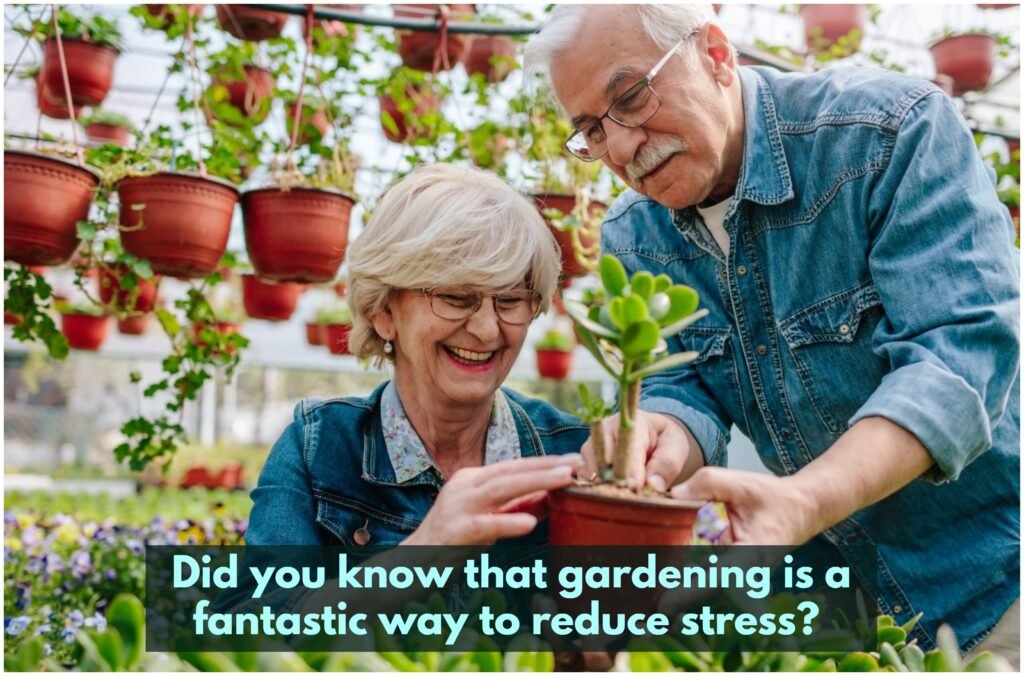
Growing Social Bonds
Gardening for seniors also plants the seeds of community and companionship. Whether it’s through community gardening projects or friendly exchanges with neighbors drawn to the beauty of a well-tended garden, it opens doors to meaningful social interactions.
Basking in Sunshine
Time spent in the garden exposes seniors to the sun, helping them soak up vital vitamin D. This sunshine vitamin plays a crucial role in keeping bones and muscles strong.
Boosting Immunity, Naturally
Engaging in gardening activities introduces seniors to the healthy bacteria in soil, enhancing their immune system in the most natural way.
Embark on a journey of discovery, joy, and health with gardening for seniors. It’s time to pick your plants and start creating your own slice of paradise. The benefits are as plentiful as the blooms you’ll nurture. Let’s dig deep and watch the wonders unfold!
Choosing the Right Plants
Gardening for seniors is a beautiful way to stay active, connect with nature, and create a beautiful outdoor space. However, it can be challenging for seniors to maintain their gardens due to physical limitations or lack of experience. But fear not, there are plenty of plants that are easy to care for and maintain, perfect for seniors who want to enjoy the benefits of gardening for seniors without the added stress.
Here are some tips and suggestions for selecting plants that are well-suited for seniors:
Choose Low-Maintenance Plants
- Gardening for seniors can be easy by noting the level of maintenance a plant needs. Low-maintenance plants are a great choice for seniors who may have difficulty with tasks like watering or pruning.
- Some examples of low-maintenance plants include succulents, which store water in their leaves and can go weeks without watering, cacti, which thrive in dry environments and only need occasional watering, and ferns, which can grow well in shaded areas and only require occasional pruning.
- Other low-maintenance options include lavender, daylilies, and hostas. Choosing these types of plants can make gardening for seniors easier and more enjoyable.
Consider Perennial Plants
- Perennial plants can be an excellent choice for seniors as they come back year after year, without the need for replanting. These plants are known for their hardiness and ability to withstand various weather conditions.
- Some examples of perennial plants that are easy to care for and maintain include lavender, chives, and sage. Lavender is a fragrant herb that requires minimal watering and pruning and can thrive in full sunlight.
- Chives are easy to grow and require little maintenance, and their leaves can be used to flavour soups, stews, and salads. Sage is another perennial herb that requires minimal care and is a great addition to any garden. Its leaves can be used in cooking or to make a soothing tea.
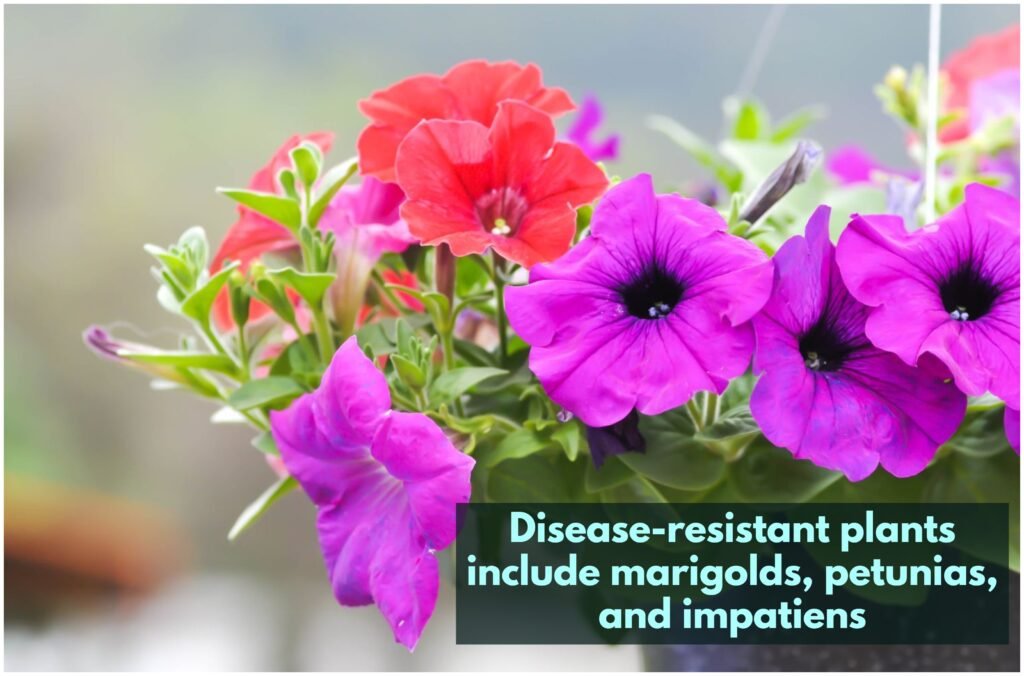
Select Plants That Are Disease-Resistant
- By choosing disease-resistant plants, seniors can reduce the need for pesticides or other chemicals on their plants. Some examples of disease-resistant plants include marigolds, petunias, and impatiens.
- Disease-resistant plants are becoming increasingly popular among seniors who are looking for a safer and more natural way to maintain their gardens. These plants have evolved to possess natural defence mechanisms that enable them to resist common plant diseases and pests.
- This makes them a great option for seniors who want to minimize their exposure to harmful chemicals, such as pesticides and herbicides, which can be particularly harmful to older adults. By incorporating disease-resistant plants into their gardens, seniors can reduce their reliance on chemicals while still enjoying a beautiful and healthy garden.
- Additionally, these plants are often easy to care for and maintain, making them a great option for seniors who may have limited mobility or strength.
Opt for Plants That Are Easy to Propagate
- Propagating plants through cuttings or division can be a great way for seniors to save money and time. Examples of plants that are easy to propagate include spider plants, jade plants, and snake plants.
- To propagate spider plants, simply cut off a “spiderette” (small plantlet) and place it in water or soil until it develops roots. Jade plants can be propagated by taking a leaf or stem cutting and allowing it to dry for a few days before planting it in the soil.
- Snake plants can be propagated by dividing the plant at the root level and planting the new sections in separate pots.
Choose Plants with Sensory Benefits
- In addition to being visually appealing, selecting plants with sensory benefits can be particularly beneficial for seniors. Plants with pleasant scents, such as lavender, rosemary, and chamomile, can have a calming effect and promote relaxation.
- Plants with interesting textures, such as lamb’s ear or the fuzzy leaves of African violets, can provide a tactile experience and stimulate the sense of touch. Incorporating sensory plants can make gardening a more immersive and enjoyable experience for seniors.
Look for Plants That Are Edible
- In addition to being easy to grow, herbs and vegetables can also provide seniors with a sense of accomplishment and purpose as they see the fruits of their labour in the form of fresh, homegrown produce.
- Seniors can also benefit from the nutritional value of the plants they grow, which can help support their overall health and well-being. Additionally, growing edible plants can be a fun way for seniors to experiment with new recipes and flavours, adding variety to their diet.
By selecting plants that are easy to care for and maintain, seniors can enjoy the benefits of gardening without feeling overwhelmed or stressed.
Container Gardening
Container gardening involves growing plants in containers instead of in the ground. This method is particularly useful for seniors who have limited space or mobility, as it allows them to garden on a smaller scale and without the need to kneel or bend down. Container gardening also provides greater control over soil quality, water, and light conditions, which can help ensure the success of the plants.
Seniors can use a variety of containers for this type of gardening, including pots, planters, hanging baskets, and window boxes.
- Pot Gardening for Seniors: Tips and Tricks
- Using pots is an excellent option for seniors who have limited space or mobility. They are easy to move around and can be placed on tables, raised garden beds, or other elevated surfaces for easier access.
- Seniors can choose from a variety of pot sizes, depending on the size of the plants they want to grow. For example, small pots are suitable for herbs or small flowers, while larger pots can accommodate vegetables or fruit trees.
- Self-watering pots are a great option for seniors who may have difficulty watering their plants regularly. These pots have a reservoir that holds water, which is gradually released to the plant as needed.
- Seniors can choose from a variety of materials for their pots, such as plastic, ceramic, or terracotta. Each material has its benefits and drawbacks, so seniors should consider their needs and preferences when selecting a pot.
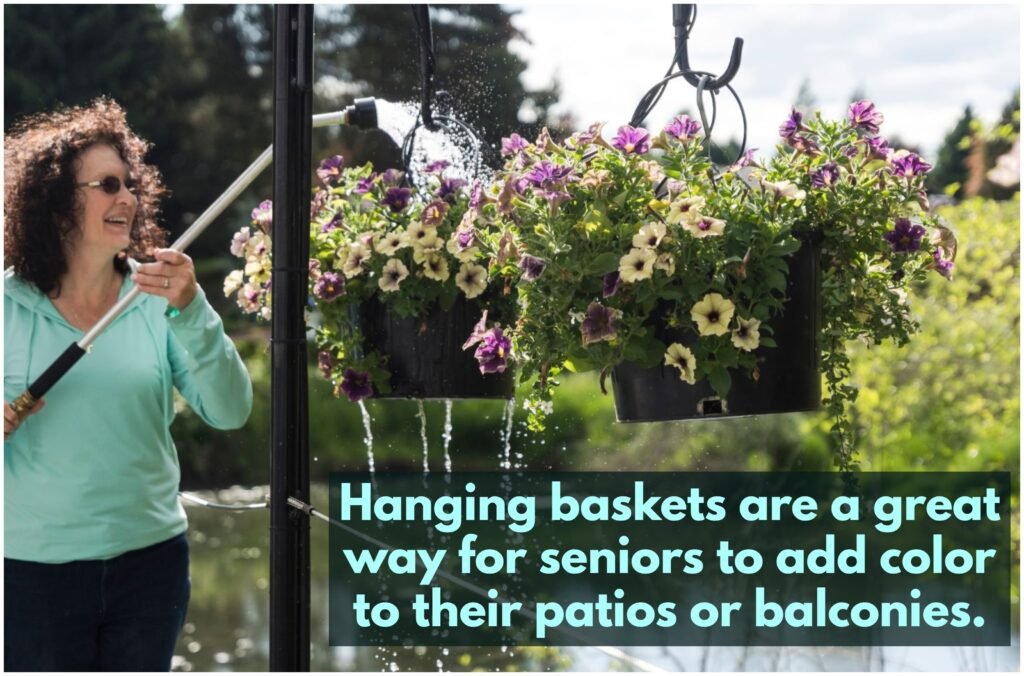
- Hanging Basket Gardening for Seniors: A Beginner’s Guide
- Hanging baskets are an excellent option for seniors who want to add some colour to their patios or balconies. They can also be hung from trees or hooks in the garden for a beautiful display.
- Seniors can choose from a variety of plants for their hanging baskets, such as petunias, fuchsias, or geraniums. These plants are low-maintenance and can thrive in a hanging basket environment.
- Seniors should consider the weight of their hanging baskets when selecting a location to hang them. They should also ensure that the baskets have proper drainage to prevent waterlogging.
- To make watering easier, seniors can use a watering wand or a long spout watering can to reach their hanging baskets.
- Window Box Gardening for Seniors: Tips and Ideas
- Window boxes are an excellent option for seniors who want to add some greenery to their windowsills. They can also be placed on balcony railings or on walls for a beautiful display.
- Seniors can choose from a variety of plants for their window boxes, such as herbs, lettuce, or strawberries. These plants are easy to care for and can provide fresh produce for the seniors’ meals.
- Seniors should ensure that their window boxes have proper drainage to prevent waterlogging. They should also consider the weight of the boxes when selecting a location to place them.
- To make watering easier, seniors can use a self-watering system or a watering can with a long spout to reach their window boxes.
Container gardening is a flexible and convenient option that can be adapted to a range of living situations, whether seniors live in apartments, assisted living facilities, or private homes.
Raised Garden Beds
Raised beds are an excellent option for seniors who have trouble bending, kneeling, or getting down to ground level. By elevating the planting area, it is easier to reach plants and perform necessary tasks without putting too much strain on the body. Raised beds can be built out of a variety of materials, such as wood, metal, or composite materials.
Kits are also available for those who don’t want to build from scratch. When selecting a location for a raised bed, it’s important to choose a spot with good sunlight and drainage. Avoid placing the bed near trees or buildings that may block sunlight, and make sure there’s a way for excess water to drain away from the bed. To fill a raised bed, use a high-quality soil mix that’s specifically formulated for raised beds or container gardening.
Avoid using regular garden soil, as it may not drain well or provide enough nutrients for the plants. Seniors can also consider adding trellises or supports to their raised beds to make it easier to grow climbing plants or vegetables, such as tomatoes or cucumbers.
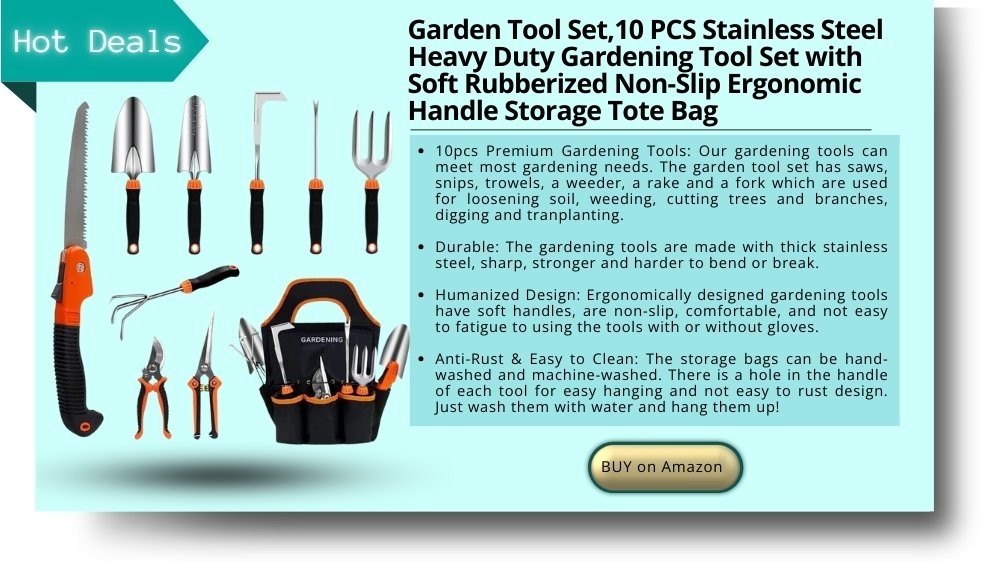
Tools and Equipment
Gardening can be a fun and rewarding activity for seniors, but it’s important that they have the right tools to make it easier and more comfortable. One option to consider is gardening tools with ergonomic handles. These tools are designed to reduce strain and fatigue on hands and wrists, making them a great option for seniors who may have arthritis or other conditions that affect their grip strength.
Some examples of ergonomic gardening tools include pruners, trowels, cultivators, and weeders. Another helpful tool for seniors is the use of long-handled tools. These can be helpful for seniors who have trouble bending or reaching, allowing them to easily tend to their plants without straining themselves. Long-handled pruners and cultivators are just a few examples of tools that can be beneficial for seniors.
Modifications can also be made to existing tools to make them easier to use for seniors. For example, foam tubing can be added to the handles of tools to make them more comfortable to grip, and larger grips can also be added to make them easier to hold. Seniors can also consider using lightweight tools made from materials such as aluminium or carbon fibre, which can reduce the overall weight of the tool and make it easier to handle.
You will also want to consider automating some of the work. One example is drip irrigation which cuts down the time it takes to water your plants.
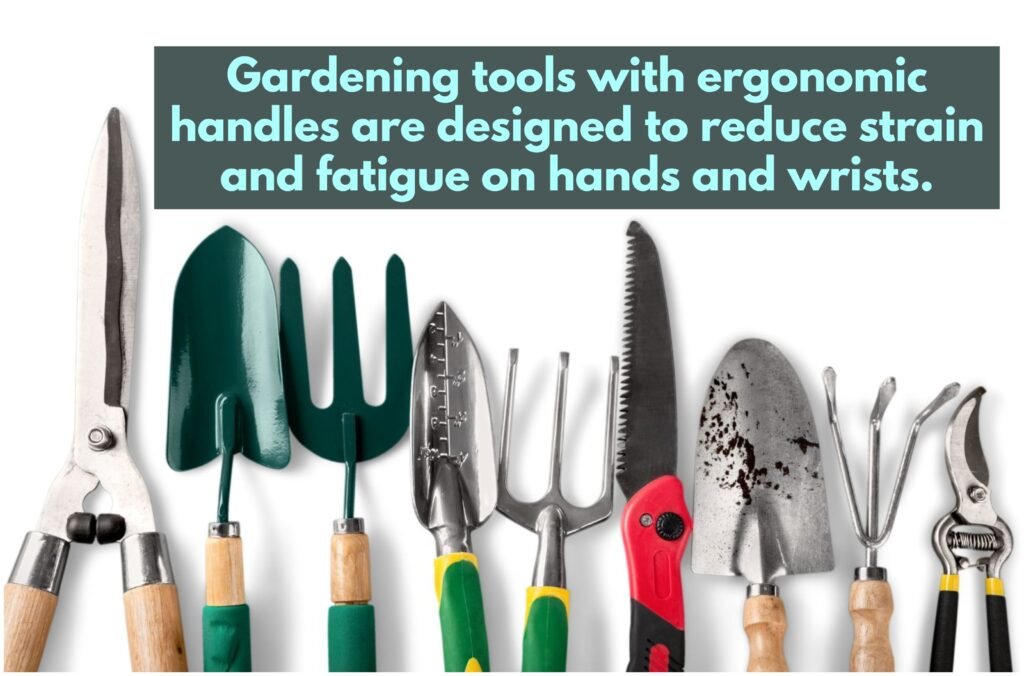
Overall, choosing the right gardening tools and making modifications when necessary can help seniors to continue enjoying their gardening hobby and reap the physical and emotional benefits it provides.
Safety Tips
Safety should be a top priority for seniors who want to engage in gardening. To avoid dehydration, seniors should drink plenty of water and take frequent breaks in shaded areas during the hot summer months. Protection from sun damage is also crucial, and seniors should wear sunscreen with at least SPF 30 and a hat to shield the face and neck from harmful UV rays.
To avoid tripping hazards, seniors should keep pathways clear and garden tools and equipment organized. Uneven ground or garden hoses can pose a risk, and extra caution should be taken in these areas.
Common gardening injuries such as cuts, scrapes, and strains can be prevented with some basic precautions. Seniors should wear gloves to protect their hands when handling sharp tools and equipment like pruning shears and hedge trimmers. These tools should be used carefully and kept sharp to reduce the risk of injury.
Repetitive motions such as bending or twisting can cause musculoskeletal injuries, and seniors should take regular breaks, stretch, and use ergonomic tools designed to reduce strain on the body.

Those who wish to engage in gardening for seniors should prioritize their safety by staying hydrated, protecting their skin from sun damage, being mindful of tripping hazards, wearing gloves when using sharp tools, and using ergonomic equipment to avoid musculoskeletal injuries. With these precautions in mind, seniors can enjoy the many benefits that gardening has to offer.
Conclusion
In conclusion, easy gardening for seniors can be a wonderful activity for seniors, providing physical exercise, emotional benefits, and a sense of accomplishment. With just a few simple tools and techniques, seniors can enjoy the beauty of nature and the satisfaction of growing their own plants, even if they have limited mobility or health issues.
Whether it’s a small planter on a windowsill, a raised bed in a community garden, or a full-fledged vegetable patch, gardening can offer seniors a therapeutic and rewarding way to stay active and engaged with the world around them. If you or a loved one are interested in getting started with gardening, consider starting small with a container garden or raised bed.
Remember to prioritize safety by staying hydrated, wearing sunscreen, and using ergonomic tools. Gardening for seniors can be a fulfilling and enjoyable activity, so don’t hesitate to get started today!
Disclaimer
The content provided on MySeniors.World is for informational purposes only and is not intended as either financial or medical advice. Always consult a qualified professional before making any investment or health-related decisions.
Posts may contain affiliate links, meaning we earn a commission – at no additional cost to you, if you click through and make a purchase. Your support helps us continue providing valuable content.

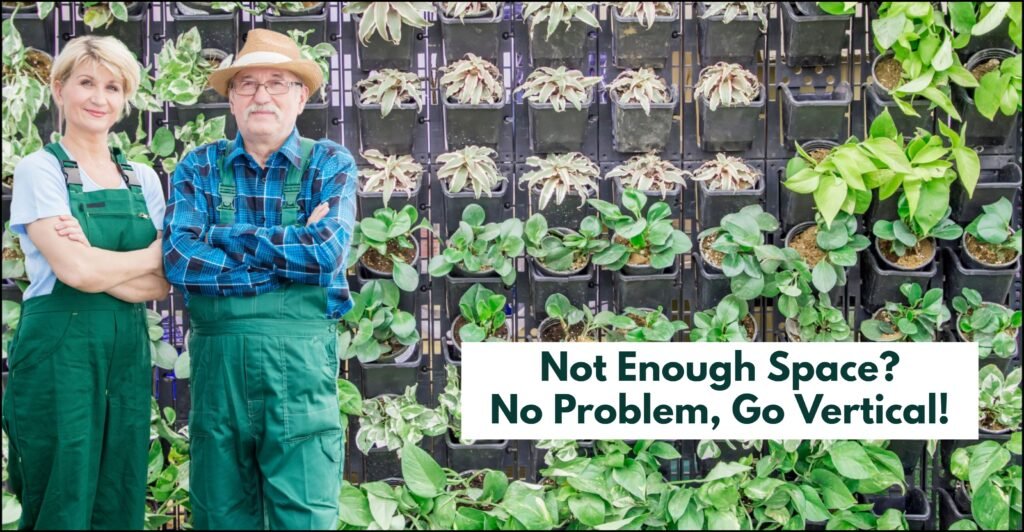
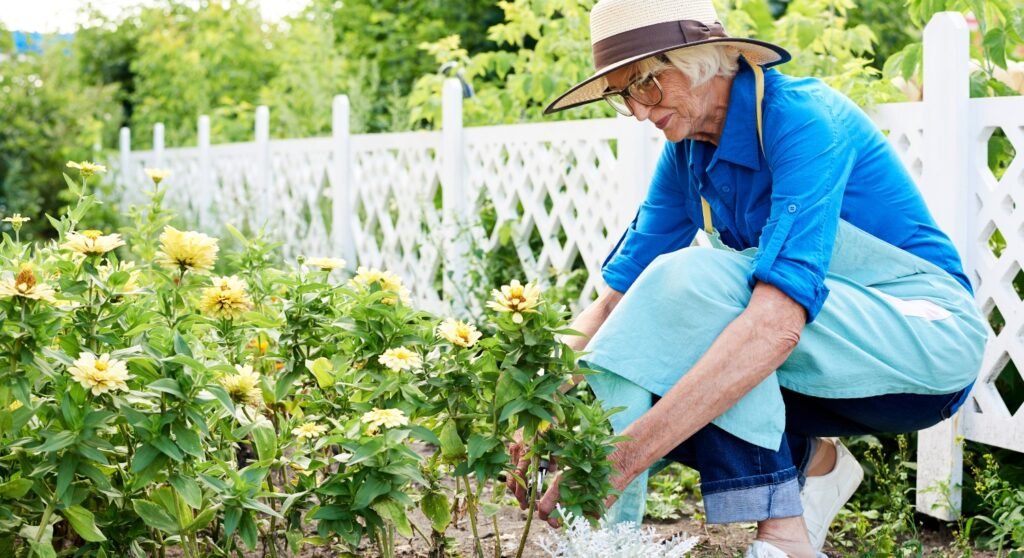
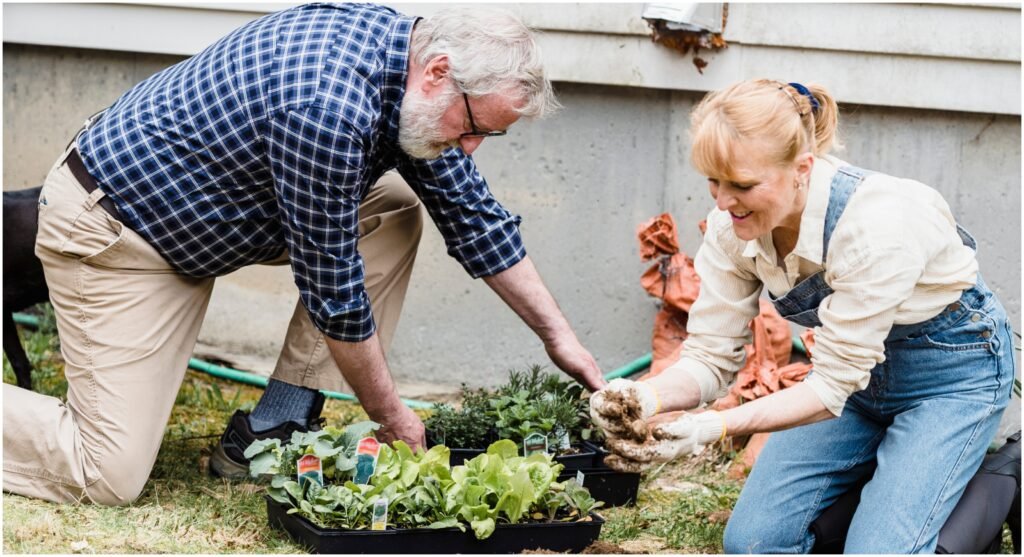


Responses